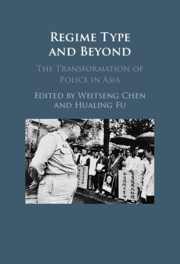Book contents
- Regime Type and Beyond
- Regime Type and Beyond
- Copyright page
- Contents
- Figures
- Tables
- Contributors
- Abbreviations
- Part I Framework
- Part II Authoritarian Policing: Past and Present
- Part III Democratic Transition and Authoritarian Resilience
- 7 Public Order, Social Drama, and Legitimate Force
- 8 Adaptive Authoritarian Policing
- 9 Organizational Legacies of Authoritarian Police in Postwar Japan
- 10 Authoritarian Policing and Democratization
- Part IV The Singapore and Hong Kong Exceptions
- Part V Conclusions
- Index
8 - Adaptive Authoritarian Policing
A Journey from China and Japan to Taiwan
from Part III - Democratic Transition and Authoritarian Resilience
Published online by Cambridge University Press: 25 May 2023
- Regime Type and Beyond
- Regime Type and Beyond
- Copyright page
- Contents
- Figures
- Tables
- Contributors
- Abbreviations
- Part I Framework
- Part II Authoritarian Policing: Past and Present
- Part III Democratic Transition and Authoritarian Resilience
- 7 Public Order, Social Drama, and Legitimate Force
- 8 Adaptive Authoritarian Policing
- 9 Organizational Legacies of Authoritarian Police in Postwar Japan
- 10 Authoritarian Policing and Democratization
- Part IV The Singapore and Hong Kong Exceptions
- Part V Conclusions
- Index
Summary
Political democratization does not necessarily lead to democratic policing; rather, authoritarian legacy always poses a challenge for the integration between democracy and coercive policing. This chapter presents a case study of Taiwan to unveil such authoritarian legacy. After its democratization in the late 1980s, Taiwan has been gradually transformed its authoritarian policing into democratic policing subject to judicial review. However, as Taiwan’s peaceful democratic transition did not come with radical political changes, authoritarian legacy persists and continues to affect policing practices. Nonetheless, throughout both authoritarian and democratic periods, the police in Taiwan have obtained strong legitimacy and been perceived as one of the most trustworthy government agencies. As such, questions to explore in this chapter include: Why has authoritarian policing been this adaptive in Taiwan? How has the coexistence between authoritarian legacy and liberal democracy been made possible? What are the impacts on democratic governance and efficacy of legal reforms?
Keywords
- Type
- Chapter
- Information
- Regime Type and BeyondThe Transformation of Police in Asia, pp. 192 - 213Publisher: Cambridge University PressPrint publication year: 2023



